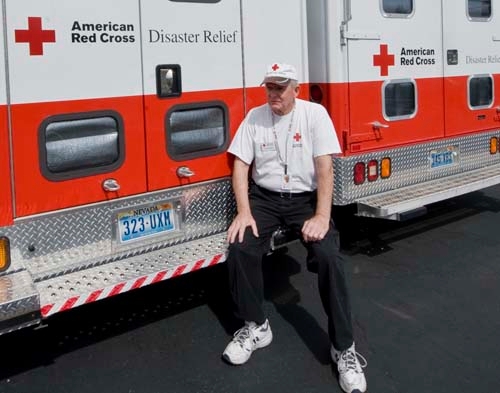Valley Red Cross workers ‘on alert’ in wake of storms


Pat Moore keeps his phone on him at all times. He’s waiting for a call (that may never come) that could send him on a 1,000-mile drive to Tornado Alley.
Moore, a volunteer for the Red Cross Southern Nevada Chapter in Las Vegas, usually would not be summoned across the country for disaster relief. But the past week hasn’t been usual.
With every headline of another tornado touching down, Moore knows the chances increase for him and a partner to take an ambulancelike Emergency Response Vehicle to the dead center of disaster, feeding and sheltering the suddenly homeless.
“The Red Cross has relief operations set up in half our country right now,” spokeswoman Jennifer Ramieh said.
More than 4,000 Red Cross relief workers are in the field.
The need is almost entirely because of storms and tornadoes in the Midwest and flooding along the Mississippi River.
“We are on alert,” she said. “Now, it’s a waiting game.”
Ramieh had seen the Mississippi River before, but as she passed over it on her way to Memphis, it was “unreal.”
“Trees looked like bushes,” said Ramieh, who went to Frasier, just outside of Memphis.
One moment sticks out most. A man walked up to Ramieh as she stood looking at four mobile-home communities. They were almost submerged, and were expected to remain that way for a month.
“He pointed to his home three-fourths under water and said he’d been sleeping under his car,” she said. “He started tearing up. It took everything I had to not break down in front of him. You could see the desperation all over his face.”
She led him to the shelter, where he was given clean clothes, food and a cot.
The stress, emotional and physical, is why Red Cross volunteers are at a site for a maximum of three weeks, said Moore, who has been volunteering for four years and went to the aftermath of hurricanes Gustav and Ike, the third-costliest hurricane ever to make landfall in the United States. He also provided relief during the San Diego wildfires.
This takes its toll on workers, Red Cross Operations Manager Deb Lancaster said. She has been hopping from one disaster to another since early April, coming home to Pahrump, 60 miles west of Las Vegas, only once for a few days before being sent to another weather-caused catastrophe.
“This is one of the biggest disasters any of us has had to handle,” said the 59-year-old, who has been with Red Cross for 25 years. “I can’t remember a series of tornadoes like this. It’s hard to explain the damage. It looks like a nuke went off. It always gets to me. No matter how many times I do this, I’m shocked.”
She’s been in Hoover, Ala., for a week overseeing teams that work directly with families experiencing a death or serious injury. An April 27 tornado outbreak killed at least 300 people across seven states, including Alabama.
“One minute they’re there, the next they’re not,” she said. “It’s hard to digest that.”
Specially designed four-person teams deal with these families one at a time. Each team has a spiritual adviser, a psychiatric specialist, a doctor or nurse, and a caseworker. The team also allows its members to comfort each other after dealing with families, Lancaster said.
Lancaster started the spring in tornado-hit Smithsfield, N.C., and likely will be in Alabama for two more weeks.
“Then, I’ll probably go somewhere else,” she said, “probably Missouri.”
That’s where Moore might end up if he’s called. He’s never helped in tornado relief but has his share of disaster experience.
He remembers Baton Rouge in particular after Hurricane Gustav in 2008.
“For two weeks, we had no hot water or electricity,” he said. “The city was dead.”
And volunteers live with the locals. No special accommodations. Moore, and those like him, don’t provide any medical aid and therefore don’t need any specialized background. He feeds the hungry.
Moore, 74, was an engineer for an NBC TV station in Detroit before retiring in Las Vegas.
If deployed, Moore’s vehicle will be packed with containers of food, providing 600 hot meals a day through a drive-through-like window on the vehicle’s side. He will work 12-hour days, seven days a week for three weeks.
Everyone receives an entrée, side and potato, he said. And they are surprised to get it.
“When we go down the street, we blow a very distinctive diesel horn so people know we’re coming,” he said.
But people have no idea what the horn means. However, like the sound of an ice cream truck, they soon learn.
“After one or two runs, people know what it is,” he said, “and come running.”
And like the ice cream truck, he’s able to bring smiles to their faces, shining a ray of light — although brief — through the murky mess.
It’s why Ramieh won’t call it quits, despite the disparity of Memphis.
“Will I go out again? Unequivocally yes,” she said.
Contact reporter Trevon Milliard at tmilliard@review journal.com or 702-383-0279.












